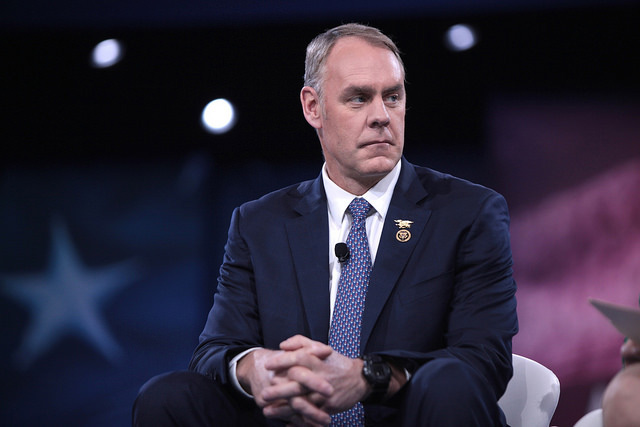
Honest, paywall-free news is rare. Please support our boldly independent journalism with a donation of any size.
President Trump’s Secretary of the Interior was confirmed on Wednesday by the Senate.
Rep. Ryan Zinke (R-Mont.) was approved by the upper chamber in a 68-31 vote, with 17 members of the Democratic Caucus backing his nomination.
Senate Minority Leader Chuck Schumer (D-N.Y.) spoke out against Zinke’s selection before the vote, casting doubt on the Congressman’s prior pledges to oppose the sale of public lands. The Department of the Interior oversees, among other agencies, the country’s National Park Service.
“You can’t be a Roosevelt Conservationist, when you vote to make it easier to sell off public lands,” Schumer said.
Zinke, an avid outdoorsman, claims to be for the preservation of parks, in the mold of NPS-founder, former Republican President Theodore Roosevelt. He has stated repeatedly that he opposes the privatization of public lands, but has voted twice in the past year to make that process easier.
During his confirmation hearing, in January, Zinke was asked about one of those votes by Sen. Martin Heinrich (D-N.M.). Heinrich had pointed out the vote took place just weeks prior to the hearing, at the start of the current session of Congress.
Zinke told Heinrich he would not have supported the proposal, which pertained to land valuation, if it had been brought up as stand-alone legislation.
“I think I voted seventeen times against either transfer or sale of public land,” he told Heinrich. The senator ended up voting in favor of Zinke’s nomination.
Though Zinke says he opposes privatization, he also vociferously supports the Trump administration’s energy agenda, which includes leasing wide swaths of public lands to the fossil fuel industry.
“The president-elect has said that we want to be [energy] independent,” Zinke said. “It is better to produce energy domestically under reasonable regulation than watch it be produced overseas with no regulation.”
“The war on coal, I believe is real,” he also stated, referring to right-wing criticism of Obama-era policies, including a ban on Interior leases to the coal industry. President Trump is expected next week to issue an executive order, reversing the moratorium, according to Reuters.
Zinke’s views on climate change also came up during the confirmation process. He denied believing, as Trump has claimed, that human-influenced warming is actually “a hoax.”
“I think where there’s debate is what that influence is and what we can do about it,” Zinke told Sen. Bernie Sanders (I-Vt.), during the confirmation hearing.
“There’s debate on this committee,” the senator responded, “but not within the scientific community.” Sanders ended up voting “no” on Zinke’s nomination.
A terrifying moment. We appeal for your support.
In the last weeks, we have witnessed an authoritarian assault on communities in Minnesota and across the nation.
The need for truthful, grassroots reporting is urgent at this cataclysmic historical moment. Yet, Trump-aligned billionaires and other allies have taken over many legacy media outlets — the culmination of a decades-long campaign to place control of the narrative into the hands of the political right.
We refuse to let Trump’s blatant propaganda machine go unchecked. Untethered to corporate ownership or advertisers, Truthout remains fearless in our reporting and our determination to use journalism as a tool for justice.
But we need your help just to fund our basic expenses. Over 80 percent of Truthout’s funding comes from small individual donations from our community of readers, and over a third of our total budget is supported by recurring monthly donors.
Truthout has launched a fundraiser to add 500 new monthly donors in the next 10 days. Whether you can make a small monthly donation or a larger one-time gift, Truthout only works with your support.